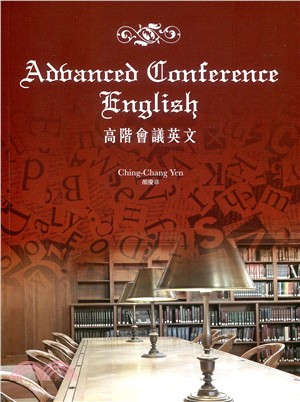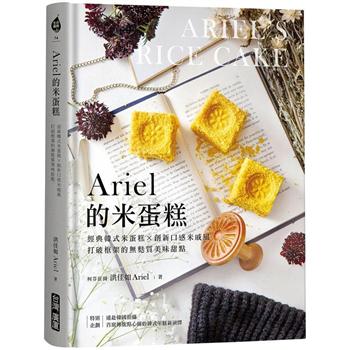本書分六章,各章二至六個小節,按部就班介紹各種會議場景,模擬一場高級的政經或學術研討會議的不同情境,並提供實用句型幫助讀者在會議中得體發言。是英文流利者想更進一步的利器,也是商業人士快速擬定演講稿、公開簡報不可或缺的工具。
第二版擴增了詞彙句型,以及更豐富的同義、近義片語參考,讓讀者使用上能事半功倍。另外新增兩小節的內容,補充讀者對於會議及其文化底蘊的深厚了解。
Conferences have become one of the most effective ways to generate and disseminate knowledge on important issues. This book touches on all aspects of a conference, so readers can become more familiar with the specific vocabulary and phrases used in an English conference.
The author of the book served as the first WTO ambassador of Taiwan from 2002 to 2005. Throughout the book, readers will become equipped with knowledge of how to function in different roles for business, political, or academic conferences.
The second edition contains more useful phrases—as well as new examples of speeches and dialogues to better prepare readers for international conferences. There are also two new sections in this edition; giving readers a more profound view of the expressions used in speeches.
作者簡介:
Ching-Chang Yen顏慶章
國立臺灣大學法學學士、政治學碩士,美國密西根大學法學碩士,威斯康辛大學法學博士。曾任財政部政務次長、部長及駐WTO首任常任代表。以學者從政的自持,累積豐富的國際會議經驗與交流心得,加上醉心英文修辭與西洋文化,寫成《高階會議英文》。
Dr. Yen is currently the Chair Professor of Law in CK Yen Foundation, Soochow University. Serving as finance minister from 2000 to 2002, he brought about the first-ever financial reform to Taiwan’s financial market. A longtime expert in GATT/WTO law, Dr. Yen was appointed to serve as Taiwan’s first WTO ambassador from 2002 to 2005. He also has been a prolific author of taxation and GATT/WTO law.
章節試閱
Gilbert K. Chesterton (1874-1936) was a great English writer, poet, philosopher, and overall intellectual. He was described by George Bernard Shaw as his “friendly enemy,” and a “man of colossal genius.” Chesterton inspired us with this memorable advice:
When it comes to life the critical thing is whether you take things for granted or take them with gratitude.
Consistent with his well-known nickname as “Prince of Paradox,” Chesterton never clearly indicated which of the two options—taking things for granted or take things with gratitude—he himself would choose.
Regardless of Chesterton’s playful ambiguity, I believe that gratitude should be a vital part of our daily lives. Gratitude connects us to other people and thereby leads us to develop a larger and more expansive view of life. Psychologically, gratitude helps us cultivate feelings of love, appreciation, generosity, and compassion.
With these thoughts about gratitude in mind, I would like to invite readers to join me in paying a tribute to the great French-German humanitarian, philosopher, and physician, Albert Schweitzer (1875-1965) who, in 1952, received the Nobel Peace Prize. Conference attendees, when considering the efforts of the conference organizer, moderator and the panelists, should remember what Schweitzer reminded us.
We should all be thankful for those people who rekindle the inner spirit.
If you spend time with professional orchestral musicians, you will likely hear them recall this or that performance by referring to the number of encores they enjoyed: “When we played in Kaohsiung last year, we received one encore;” or “in 2010 we had one of our best performances ever…we played three encores, and the audience still was not satisfied.” In other words, the metric of success for the performers is oftentimes the level of satisfaction expressed by the audience.
Once again, conferences and symposiums are similar in some ways to orchestra concerts. Whereas orchestra musicians talk about receiving encores from the audience, panelists and moderators might assess the success of their sessions in terms of an ovation or the degree of engagement: “We received a long standing ovation during our Thursday afternoon session,” or “People were really engaged after our discussion; everybody wanted to jump in; we could have answered questions all night.” In other words, the metric for panel discussions is the degree to which the general participant expresses appreciation.
This means that your response, as a general participant, is monitored carefully. Whether or not you express appreciation, and how you do so, are important gauges to the success of the conference. There are several ways for you to express appreciation. First, you must see yourself as a member of the collective, the entire audience. Your applause adds to the applause from everyone in the hall. A more powerful, challenging method of expression is to raise your hand to express appreciation directly in front of everybody. In this Chapter 3.3, I will study some ways to express appreciation to panelists and moderators.
Before concluding this chapter, I wish to share with you a lesson given by William Arthur (1819-1901), a Wesleyan Methodist minister and author. He elegantly stated this:
Flatter me, and I may not believe you. Criticize me, and I may not like you. Ignore me, and I may not forgive you. Encourage me, and I may not forget you.
An anonymous quote related to Mr. Arthur’s words, goes like this:
There is always, always, always something to be thankful for.
As a participant in a conference, you will always have plenty for which to be thankful. Thankfulness is not only a virtue, but the act of being thankful for the little things, in fact, can bring us more joy in life.
Gilbert K. Chesterton (1874-1936) was a great English writer, poet, philosopher, and overall intellectual. He was described by George Bernard Shaw as his “friendly enemy,” and a “man of colossal genius.” Chesterton inspired us with this memorable advice:
When it comes to life the critical thing is whether you take things for granted or take them with gratitude.
Consistent with his well-known nickname as “Prince of Paradox,” Chesterton never clearly indicated which of the two options—ta...
目錄
Table of Contents 目 次
Preface 自序
Prologue 前言
Chapter 1 Preparing to Be a Moderator會議主持人的準備
1.0 Introduction引言
1.1 Housekeeping不宜輕忽的細節
1.2 Formal Introduction of the Panel and of a Keynote Speaker介紹場次及主講或與談人
1.3 Key Points about Being a Good Moderator成功主持人的要素
1.4 Steering the Conversation in the Right Direction正確引導會談方向
1.5 Communication with the Audience與聽眾溝通
1.6 Bringing to Conclusion做好結語
Chapter 2 Refine Your English for Being a Panelist主講或與談人如何精進英文
2.0 Introduction引言
2.1 Expressing Appreciation to the Moderator向主持人致謝
2.2 Expressing Your Opinion暢述意見
2.3 Addressing the Audience向聽眾講話
2.4 Anticipating the Comments from Fellow Panelists回應同場與談人的評論
2.5 Holding Ground in the Face of Disagreement異議時掌握論據
2.6 Answering Questions回答問題
Chapter 3 Being a General Participant at a Conference會議參與者的角色
3.0 Introduction引言
3.1 Understanding Your Role as an Important Contributor認知您的貢獻角色
3.2 Making Your Point Clear and Concise清晰扼要敘述論點
3.3 Expressing Appreciation as a General Participant會議參與者的致謝
Chapter 4 Establishing the Correct Tone for Conferences確立會議的合宜語調
4.0 Introduction引言
4.1 Formulating Main Ideas形成主要理念
4.2 Setting the Level of Urgency設定輕重緩急語調
4.3 Refining Phrases: Being For and Against Something贊成或反對的修辭
4.4 Work with Modal Verbs: Escalation of Tones強化語調的動詞例示
4.5 The Difference between Serious, Playful, and Humorous Language莊重、輕鬆與幽默文句的差異
Chapter 5 Negotiating at the WTO and for the Other Trade Pacts世界貿易組織與其他貿易協定的談判
5.0 Introduction引言
5.1 Delivering a Powerful Introduction如何生動發言
5.2 Multilateral versus Bilateral Negotiations多邊暨雙邊談判
Chapter 6 Preparing for Social Functions準備社交活動
6.0 Introduction引言
6.1 In Wine There Is Culture葡萄酒中有文化
6.2 Presiding over a Dinner Party主持晚宴
6.3 Socializing at a Casual Reception參與酒會
6.4 Being a Welcomed Guest做好受歡迎的客人
Table of Contents 目 次
Preface 自序
Prologue 前言
Chapter 1 Preparing to Be a Moderator會議主持人的準備
1.0 Introduction引言
1.1 Housekeeping不宜輕忽的細節
1.2 Formal Introduction of the Panel and of a Keynote Speaker介紹場次及主講或與談人
1.3 Key Points about Being a Good Moderator成功主持人的要素
1.4 Steering the Conversation in the Right Direction正確引導會談方向
1.5 Communication with the Audience與聽眾溝通
1.6 Bringing to Conclusion做好結語
Chapter 2 Refine Your English for...

 共 7 筆 → 查價格、看圖書介紹
共 7 筆 → 查價格、看圖書介紹











